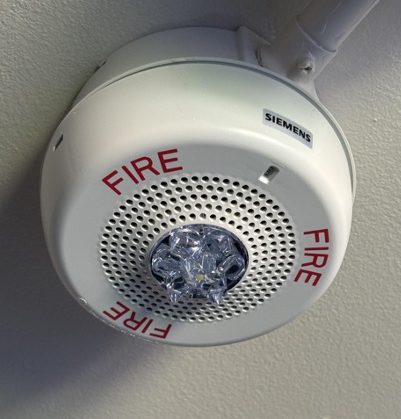Sept. 6, at around 2 a.m. the very first fire alarm of the 2024-2025 school year went off in Newman Towers, not even a full 24 hours after the last group of students’ move-in dates. Unfortunately for the residents of Newman, this would only be a taste of what was to come, as students have become increasingly annoyed with the nuisance that the fire alarms have become over the first couple of months of the semester.
Natalie Moorer ‘27 is a resident of Newman Towers and has firsthand experience with the fire alarm surge.
“The most annoying part is how long they go on for… there was this one time not too long ago where they had like five back-to-back, I thought the building was about to collapse,” Moorer said.
Moorer also expressed concern about how the fire alarms affected her class attendance. She said that it is especially inconvenient when the alarms go off before class because they interfere with her daily routine.
“I’m trying to get my clothes on because I’m rushing to class, now I’m 10-20 minutes late because of the alarms and I’m still in my robe,” Moorer said.
With the paranoia of never knowing when the fire alarms will go off, fellow Newman Towers resident Nathan Goodwin ‘27 explained how the uncertainty keeps him from doing his assignments.
“The one thing that is concerning about the fire alarms is that I have these take-home tests for biology, so I need to take them home and do them. And I am afraid to take them at the dorm because if we get a fire alarm and I am forced to leave in the middle of the test, that would be very problematic,” Goodwin said.
However, Goodwin finds a slight positive in the fire alarms, as he says that he uses them as a chance to take out his trash.
Goodwin’s roommate Brandon Rodriguez ‘27 discussed ways to combat fire alarm disturbance while evacuating the building.
“Well since we have had to walk out… I’ve started wearing earplugs to sleep just so that it won’t get too grating to hear. And on a slightly lesser note, whenever I even use the microwave or anything in the kitchen really, I’ll throw on the ceiling fan, just so there’s no chance of the fire alarms going off,” Rodriguez said.
Rodriguez also mentioned that on Tuesday, Sept. 10 at 8:30 a.m., Environmental Health and Safety (EHS) sent out an email to students running down the procedures students need to take while a fire alarm is happening, as well as some tips for fire safety. He then mentions that there is a section in this email listing the potential causes of the fire alarms.
That particular section reads, “Be mindful when cooking not to set the stove-top temperature too high. Check the oven contents prior to preheating and use kitchen hood fans. Never leave cooking unattended,” the email reads. “Not all alarms are caused by cooking. False alarms can also be caused by excessive use of hairspray, body spray or other aerosols, vaping, steam, etc.”
For more information on how to deal with similar emergencies, please visit The Environmental Health & Safety website for preparedness and safety strategies relating to fire alarms and much more.











































































































